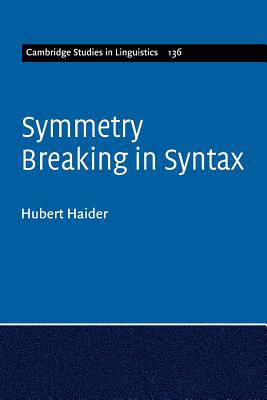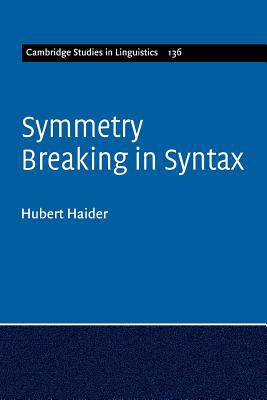
Door een staking bij bpost kan je online bestelling op dit moment iets langer onderweg zijn dan voorzien. Dringend iets nodig? Onze winkels ontvangen jou met open armen!
- Afhalen na 1 uur in een winkel met voorraad
- Gratis thuislevering in België vanaf € 30
- Ruim aanbod met 7 miljoen producten
Door een staking bij bpost kan je online bestelling op dit moment iets langer onderweg zijn dan voorzien. Dringend iets nodig? Onze winkels ontvangen jou met open armen!
- Afhalen na 1 uur in een winkel met voorraad
- Gratis thuislevering in België vanaf € 30
- Ruim aanbod met 7 miljoen producten
Zoeken
Omschrijving
In this illuminating new theory of grammar, Hubert Haider demonstrates that there is a basic asymmetry in the phrase structure of any language, whatever sentence structure it takes. Moreover, he argues that understanding this asymmetry is the key to understanding the grammatical causality underlying a broad range of core syntactic phenomena. Until now, Germanic languages have been seen to fall into two distinct classes: those which take an object-verb sentence structure (OV) or a verb-object one (VO). However, by examining the nature of this universal underlying asymmetry, Hubert Haider reveals a third syntactic type: 'Type III'. In particular, he employs the third type to explore the cognitive evolution of grammar which gave rise to the structural asymmetry and its typological implications. Symmetry Breaking in Syntax will appeal to academic researchers and graduate students involved in comparative and theoretical syntax and the cognitive evolution of grammar.
Specificaties
Betrokkenen
- Auteur(s):
- Uitgeverij:
Inhoud
- Aantal bladzijden:
- 284
- Taal:
- Engels
- Reeks:
- Reeksnummer:
- nr. 136
Eigenschappen
- Productcode (EAN):
- 9781316604809
- Verschijningsdatum:
- 23/06/2016
- Uitvoering:
- Paperback
- Formaat:
- Trade paperback (VS)
- Afmetingen:
- 152 mm x 229 mm
- Gewicht:
- 381 g

Alleen bij Standaard Boekhandel
+ 135 punten op je klantenkaart van Standaard Boekhandel
Beoordelingen
We publiceren alleen reviews die voldoen aan de voorwaarden voor reviews. Bekijk onze voorwaarden voor reviews.











